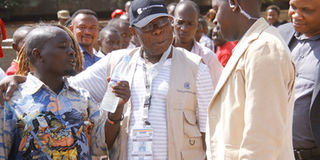Observers give mixed reactions on election

Former Nigerian president and commonwealth election observer Olusegun Obasanjo at Kakajjo II Polling Station in Bukesa, Lubaga Division, yesterday. PHOTO BY Abubaker Lubowa
What you need to know:
The presidential and parliamentary elections yesterday were met with mixed reactions from both local and international observers this newspaper talked to by press time.
Kampala
The presidential and parliamentary elections yesterday were met with mixed reactions from both local and international observers this newspaper talked to by press time.
Polling stations opened as early at 7am but at some, voting had not started hours later.
The Chief Observer of European Union Election Observation Mission, Eduard Kukan, told journalists at the National Theatre Polling Station in Kampala: “Besides polling stations opening late, voting has been calm and there is no tension, I hope this continues so that Ugandans can have peaceful elections.”
The head of the Commonwealth Observer Group, former President of Nigeria Olusegun Obasanjo, said the polls started off with a wave of “enthusiasm” but which was later detracted with the delays which he described as “inexcusable.”
“The voting was generally peaceful,” he said. “But there was a little agitation in a couple of places that we visited like Kanyanya” a Kampala surbub. Mr Obasango and his team visited about 20 polling stations around Kampala and Wakiso. The Commonwealth group expects to issue a more detailed but preliminary report of observation on Saturday.
A coalition of local election observers, Citizens Election Observers Election Network Uganda (CEON-U), indicated that the ruling NRM party had deployed agents in at least 85 per cent of the polling stations while the FDC party’s polling agent’s network covered 79 per cent. Former Prime Minister Amama Mbabazi’s polling agent network was put at 39 per cent across the country.
CEON-U’s chairperson, Livingstone Ssewanyana, noted that 95 out of every 100 polling stations: “had all strategic materials with the other remaining polling stations missing at least one of the ballot boxes, voter register, ballot papers, indelible ink, Biometric Voter Verification System (BVVS) or declaration of results form.”
In what they called a preliminary report CEON-U however, appeared out of touch with reality. Ms Jacqueline Asiimwe Mwesige, a voter in Makindye division in Kampala, reported ballot boxes dispatched to her polling station lacked ballot papers while a KFM radio listener from Arua District called in to cry out how the BVVS indicated he had voted yet he had queued for several hours.
“Despite the delays we commend the voters of Uganda for actively participating up until this point,” Dr Ssewanyana said, anticipating a higher voter turnout than in the 2011 general election where over five million registered voters stayed away from the polls.
At 55 per cent of polling stations, EC officials arrived by 6.30am and in 99 per cent of polling stations at least five registered voters were present before the opening of the polling kits. CEON-U claimed 41 out every 100 polling stations countrywide opened after 8am but by 2pm some stations in and around Kampala and parts of Wakiso had not opened, stirring anxiety among agitated voters.
In another preliminary assessment, the Foundation for Human Rights Initiative and Women Leadership Development, who indicated had deployed a total of 118 observers at 118 polling stations in 57 districts, reported failure of the Biometric Voter Verification system (BVVS) at some polling stations.
By Ivan Okuda, Henry Lubega
& Frederic Musisi



